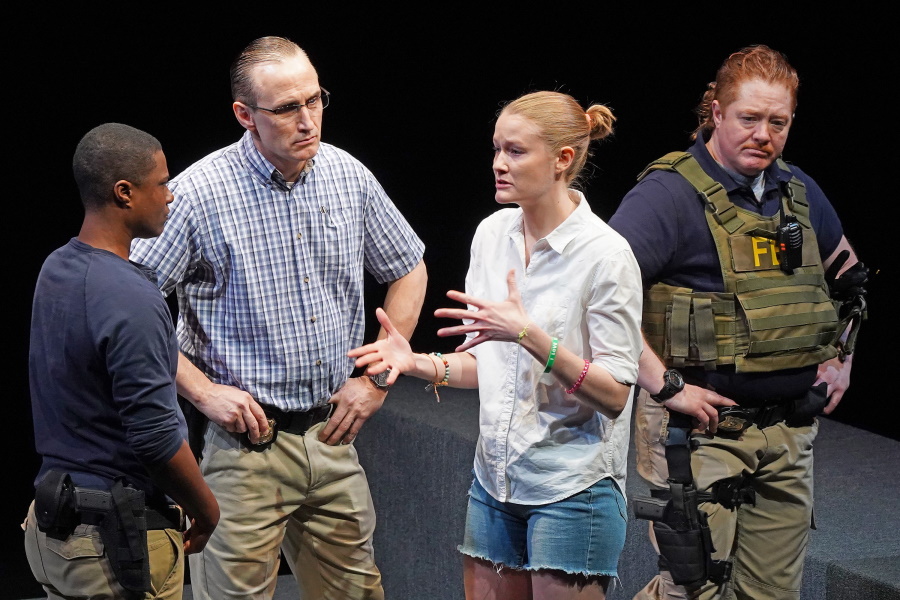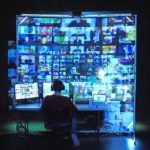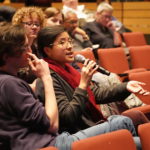Last weekend, Cliff Lampe, a professor in the University of Michigan‘s School of Information, led a workshop on how to become an internet troll. Attendees explored such tactics as sock-puppet identities and doxxing, and learned how to resist cyber attacks. Another recent campus event included a conversation about espionage with Barbara McQuade, a U-M law professor and NBC News legal analyst, and Greg Stejskal, a former FBI special agent. Is it too late to register for class this semester?
In fact these lively discussions weren’t part of a curriculum per se. They were open to U-M students, and the general public, as part of the No Safety Net Festival. The three-week biennial theatre festival, which was first presented in 2018, is produced by the University Musical Society (UMS), an affiliated presenting house on the school’s sprawling campus. The festival brings together performance artists from around the globe to present provocative theatre works and facilitates community events around social change.
The lineup for the 2020 festival, which began on Jan. 22, includes The Believers Are But Brothers, written and performed by Javaad Alipoor; Half Straddle’s Is This a Room by Tina Satter; White Feminist, written and performed by Lee Minora; and a one-on-one performance called As Far As My Fingertips Take Me by Tania El Khoury. The festival runs through Feb. 9.
“We are privileging content that feels politically engaged or relevant to the time we’re living in,” says Mary Roeder, programming manager at UMS. The No Safety Net Festival comprises works that are “artistically strong but hold up to intellectual scrutiny,” explains Roeder. “We chase after those projects.” Roeder, along with other UMS staff members, travel across the U.S. and abroad to curate the festival’s programming. Some of this year’s picks were culled from Scotland’s Edinburgh Festival Fringe and the Take Me Somewhere festival in Glasgow.
From internet security to meme culture, from border discrimination to pussy hats, this year’s festival probes a lot of political and social questions. “It’s easy to assume the politics of these pieces are left-leaning and are going to be preaching to the choir, but there is a neutral space that exists in a lot of these that we are trying to mine,” says Roeder, noting that talkbacks and workshops are a big part of the programming.
“There is so much contextual programming scaffolding around these performances, and so much public dialogue that the artists are thrust into,” says Roeder. The No Safety Net team seeks out artists who are interested in facilitating dialogue and visiting classrooms during the festival.
Tina Satter, whose much lauded production of Is This A Room just wrapped an extended production at Vineyard Theatre in New York City, has been more than happy to partake in programming. Satter served as a playwright-in-residence at the University in 2015, and was excited to return to campus to work with UMS for No Safety Net.
Is This A Room is a docu-play featuring the verbatim transcript of the FBI’s interrogation of 25-year-old Reality Winner, a former Air Force linguist charged with leaking evidence of Russian interference in the 2016 presidential election. UMS is uniquely poised to present the show: Alex Halderman, the director of the University of Michigan Center for Computer Security and Society, was contacted by the Intercept, the publication Winner mailed the documents to, about the validity of the information before it was published. Halderman, along with Winner’s mother, Billie Winner-Davis, were both part of workshops and talkbacks as part of the festival.
“The work [UMS] has done with us over the past year we’ve been with them in conversation is unlike any other arts organization that we’ve worked with,” says Satter, noting that she visited campus in September to begin working on the festival. Part of the planning process also included recording a podcast series featuring interviews with all of the artists, which was released in the fall.
It isn’t unusual for festivals to build out programming around the works they present. University and cultural institutions with similar festival ethos to No Safety Net include the Walker Arts Center at the Contemporary Art Museum in Minneapolis, the Fusebox Festival at the University of Texas, and the Time-Based Art Festival at the Portland Institute for Contemporary Art in Oregeon, to name a few. In fact, Is This a Room appeared at Walker Arts Center last month, where Satter led a workshop with students at a performing arts high school, and the show heads to Fusebox next.
Perhaps what sets No Safety Net apart, though, is the special effort taken to ensure that students on campus—particularly those who are not part of the school’s theatre or performance programs—have an opportunity to experience the programming.
“When we know the season, we have convenings with faculty across the campus and they’re given an opportunity to build syllabi around the programming,” says Roeder. There’s even one class that is built entirely around the festival shows; the themes of the selected works inform the coursework for a whole semester. Moreover, $500 course-development grants are available to support student ticket subsidies.
Becca Pickus, who teaches a Theatre and Incarceration course as part of the university’s Prison Creative Arts Project, was thrilled to have her application for class participation accepted. (There was a lot of interest from a variety of schools on campus and limited tickets.)
“In the Theatre and Incarceration class, one of our key objectives is to think about how creative arts, both practice and expression, can be leveraged and utilized for various objectives—one of them being engagement in social justice topics,” says Pickus, noting that all of the No Safety Net Festival shows centered on topics relevant to the curriculum.
Students in that class had the opportunity to attend a performance of Is This A Room last weekend. While approximately a third of the students in the class are theatre or performance majors, many of the students are pursuing degrees in psychology, social work, and law. As part of the class, the students will submit written reports on their experiences. Plus, their observations of the show will surely apply to their weekly off-campus work at detention centers and prisons, where they facilitate creative workshops with inmates.
Adam B. Eickmeyer, the academic director of the the Health Sciences Scholars Program, was thrilled to introduce students from the Perspectives on Health and Health Care class to theatre. The No Safety Net Festival was a formative theatre experience for many of the freshman students, who saw either The Believers Are But Brothers or Is This A Room.
Javaad Alipoor, the creator and performer of The Believers, visited with the 120 students last week to talk about the process of developing the multimedia show, which follows three men’s journeys to radicalization. While the shows’ topics may seem irrelevant to a health class, Eickmeyer explains that the course addresses how political and social issues feed into public health problems.
“The way that I have framed it for the students this semester is that these are huge societal issues that impact our health, of course, but they also impact us in general as people and residents of the United States,” says Eickmeyer. “I want them to be able see the ways in which people use creative expression to portray some of these things.”
Eickmeyer hopes that the performances of Is This A Room and The Believers will help to humanize some of the more abstract topics the students confront in class. “We’re helping them see the human aspect of it, and to remember not to lose sight of the data that we’re talking about, like health disparities and cancer statistics, which are things that represent actual people,” says Eickmeyer. His class will participate in a team-based learning exercise, in which the students will share critiques of the show they attended.
Eickmeyer and Pickus both encourage other educational institutions to incorporate live performance into course curriculum. Aside from the academic benefit, seeing theatre is a special opportunity for their students to have a social and creative outlet outside of their studies.
Ruby Pérez, a sophomore in the Theatre and Incarceration course, shared this via email: “Is This a Room was a very challenging and relevant story that I am grateful to see have seen onstage. It really made me ask: What would you do? Why are things this way? Great theatre is supposed to make us ask ourselves these questions, and though we don’t always leave with an answer, we leave with a new consciousness.”










